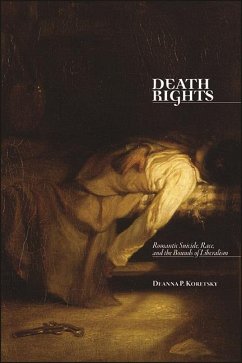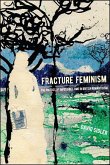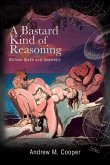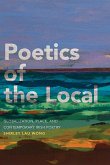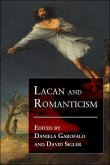Death Rights presents an antiracist critique of British romanticism by deconstructing one of its organizing tropes-the suicidal creative "genius." Putting texts by Olaudah Equiano, Mary Shelley, John Keats, and others into critical conversation with African American literature, black studies, and feminist theory, Deanna P. Koretsky argues that romanticism is part and parcel of the legal and philosophical discourses underwriting liberal modernity's antiblack foundations. Read in this context, the trope of romantic suicide serves a distinct political function, indexing the limits of liberal subjectivity and (re)inscribing the rights and freedoms promised by liberalism as the exclusive province of white men.
The first book-length study of suicide in British romanticism, Death Rights also points to the enduring legacy of romantic ideals in the academy and contemporary culture more broadly. Koretsky challenges scholars working in historically Eurocentric fields to rethink their identification with epistemes rooted in antiblackness. And, through discussions of recent cultural touchstones such as Kurt Cobain's resurgence in hip-hop and Victor LaValle's comic book sequel to Frankenstein, Koretsky provides all readers with a trenchant analysis of how eighteenth-century ideas about suicide continue to routinize antiblackness in the modern world.
This book is freely available in an open access edition thanks to the National Endowment for the Humanities Fellowships Open Book Program-a limited competition designed to make outstanding humanities books available to a wide audience. Learn more at the Fellowships Open Book Program website at: https://www.neh.gov/grants/odh/FOBP, and access the book online at the SUNY Open Access Repository at http://hdl.handle.net/20.500.12648/1712.
The first book-length study of suicide in British romanticism, Death Rights also points to the enduring legacy of romantic ideals in the academy and contemporary culture more broadly. Koretsky challenges scholars working in historically Eurocentric fields to rethink their identification with epistemes rooted in antiblackness. And, through discussions of recent cultural touchstones such as Kurt Cobain's resurgence in hip-hop and Victor LaValle's comic book sequel to Frankenstein, Koretsky provides all readers with a trenchant analysis of how eighteenth-century ideas about suicide continue to routinize antiblackness in the modern world.
This book is freely available in an open access edition thanks to the National Endowment for the Humanities Fellowships Open Book Program-a limited competition designed to make outstanding humanities books available to a wide audience. Learn more at the Fellowships Open Book Program website at: https://www.neh.gov/grants/odh/FOBP, and access the book online at the SUNY Open Access Repository at http://hdl.handle.net/20.500.12648/1712.
Dieser Download kann aus rechtlichen Gründen nur mit Rechnungsadresse in A, D ausgeliefert werden.

